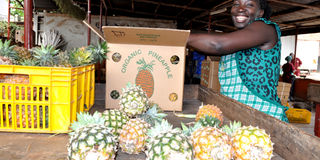Prime
UK deals: Can Ugandan exporters grab opportunity?

What you need to know:
Safety. Uganda’s agricultural exports are of lower safety standards, leaving them out of the lucrative organic food market in the United Kingdom.
The writing is on the wall that Uganda’s contribution in agribusiness export has remained minimal, with Kenya taking a lion’s share among East African states to export organic food to the United Kingdown (UK).
The country will now have to play a very tactical economic ball game in her quest to have an agribusiness footprint in the United Kingdoms’ lucrative billion dollar organic agro produce market.
Recently, it was a tall order for Finance Permanent Secretary Ramathan Ggoobi to explain Uganda’s poor score to the virtual audience during a discussion at a UK Uganda Trade Convention.
Mr Ggoobi, who assumed office with a new mantra, ‘Economics that works’ implores that agribusiness exporters are yet to step up to the task since statistics reveal that only £7.2 million (Shs35 billion) agro exports was earned from the UK market in 2019, according to Foreign Affairs Ministry figures.
This contribution has mainly been from organic produce exports such as edible vegetables, roots and tubers, coffee, tea, spices and fruits.
The problem seems to extend across to the African continent which accounts for less than 4 per cent of the $2 trillion in global agricultural trade.
These export figures are simply a fraction of the UK organic market which has grown to £2.7 billion (Shs13 trillion) in 2021, according to the UK’s organic market report - revealing the highest year –on year growth in the last 15 years.
UK’s relationship with Uganda has been built through the prism of trade and investment opportunities, and currently with an estimated worth £2.379 billion (Shs 11.2 trillion) of projects in Uganda.

Workers package ginger for export. Uganda still lacks post-harvest handling technologies that can enable proper storage of food safety. PHOTO/rachel mabala
With government increasingly looking for a package of concessional and non-concessional financing deals given the tight budgets, the business to business interaction is bound to increase.
In his recent speech at the Convention, UK Prime Minister’s trade envoy to Uganda, Lord Dolar Popat said he would work with Ministry of Trade to launch a trade forum that seeks to promote opportunities for UK and Uganda business relations, and provide export finance.
“Ultimately, we want to increase bilateral trade between Uganda and the UK. Our offer to business includes UK Export Finance, private investment vehicles and Official Development Assistance led finance,” he said.
The UK has already pledged £594 million (Shs 2.8 trillion) worth of commercial deals in the next 12 months in a range of sectors including agricultural facilities such as processing and storage, urban roads, rail locomotives and transmission lines.
“There’s increasing interest by Uganda on agro-related infrastructure development. However these are in very early stages of development and not captured in the deals pipeline,” Lord Popat said expressing optimism.
All this comes at the backdrop of East African states negotiating for a UK-EAC trade deal that Kenya has already acceded to. Uganda has indicated interest in joining but negotiations are yet to restart.
Is Uganda slow?
But where does Uganda’s failure to take up UK’s lucrative offers especially in agriculture stem from considering that that is her comparative advantage?
An analysis by Prosper magazine of a recently published Commonwealth policy paper on Uganda’s agricultural organic produce acknowledges the country’s potential.
However, the linkages between Uganda’s production potential with the UK’s organic market is not fully developed.
Several constraints are spelt out including; limited capacity of Ugandan processors and exporters who typically have a turnover of between one half and one million US dollars.
“Due to the country’s geography, the lack of a port in the country limits the medium to long-term shelf life of products,” the paper reads in part.
Food safety concerns
The failure for the agribusiness sector to realise her full potential was aptly captured by Ms Perez Ochieng, a panelist at the Convention who says Uganda will have to agree on food safety if the country has plans of increasing her access to the UK market because of stringent regulations.
Ms Ochieng, a Ugandan residing in the UK runs Sacoma Global Foods Innovation and understands the intricacies of the organic food trade.
In her recent panel submission at the Convention, Ms Ochieng aptly captures Uganda’s food situation saying; “Food safety is around post-harvest handling technologies. But there’s a rise of contamination of food with yeast and moulds.”
She continues to say, “Some products such as groundnuts have high demand and it’s regarded as a super food with continuous demand. But why is there less export of groundnuts from Uganda to the UK?”
The problem is microbiological in nature since laboratory tests for food products whether in local or UK laboratories have revealed aflatoxins have remained a constant issue.
“This perhaps shows, Uganda still lacks post-harvest handling technologies that can enable proper storage of food safety,” she notes.

Workers pack bananas for export at AMFRI farms Kyampisi in Nakaseke district. PHOTO/P. Murungi
With poor storage, aflatoxins have been recorded to affect close 30 to 40 per cent of food products in that food value chain.
Ms Acheing also highlights country’s limited capacity of the Ugandan processors and exporters who typically have failed to produce ‘what is enough’ for the export market.
Sustaining supply
As Uganda prepares for agro processing industries across the country, Ms Achieng warns about “building big factories that have not taken into consideration the sustainable supply of raw materials.”
“You can’t build a factory that runs today, and it shuts down tomorrow because you don’t have raw materials. I have seen that happen in a lot of African countries, whether, big or small!” she mentions.
She provides a vivid example in Nigeria, West Africa, where Africa’s richest man Aliko Dangote failed to get an all year supply for tomatoes to his factory despite having a huge export market to China.
Back home, a close example has been the Soroti fruit factory which according to media reports, has failed to live up to the billing of having constant supply of fruits to the factory from farmers.
As the world transforms into disruptive manufacturing where there is constant change in technology, East African states are still coping with agro-processors running locally made machinery that has not been certified by global standard bodies.
“What sort of machinery should they invest in?” Achieng asks, “If your machinery is not certified, whatever process you engage in; is flawed from the beginning.”
Achieng’s two cents is for Ugandans to invest in super organic foods such as millet, groundnuts and sugarcane juice that are increasingly being demanded on the global market.
Uganda has expressed willingness to tap into the lucrative financing deals that the UK is offering to grow the agribusiness sector.
The first, according to Ggoobi is cutting back on transportation costs with a direct flight to the UK. A process that is in the offing, and its expected Uganda Airlines will begin its flights to London by November this year.
“Once finalised, this will open up new opportunities for trade including perishable goods and tourism,” he says.
Prime Minister Robinah Nabbanja expresses optimism about the revival, and possible flights of the Airline that she hopes will have a quick turn round time to Ugandan agro produce to hit UK market shelves.
This perhaps, will also help in providing a longer shelf life for perishable agro produce.
“Uganda produces some of the best organic coffee and beef. We encourage the UK people to import our products. With the revival of Uganda airlines, you are rest assured on transportation,” she assured the virtual audience at the Convention.
Uganda is also mulling over doubling production capacity for agricultural produce to boost her export volumes in the next five years.
This among others includes improving on the investment climate.
Mr Robert Mukiza, the Director General at Uganda Investment Authority assured Ugandan diaspora investors of a free 10-year tax holiday to citizens investing in agribusiness processing supplemented with free land in the industrial parks.
Looking at key commodity metrics, Uganda exports 5 million bags of processed coffee, while tea production is increasing at 80 million kilogrammes of tea leaf annually but is yet to meet the global demand.
The diary sector produces 2.5 billion litres annually but is yet to make inroads into the global dairy trade.
If the metrics don’t lie, and with the right mindset, Mr Ggoobi announced the plan in the next five years is to improve productivity, and invest in research and development, extension services, and input on quantity and quality.
“Mechanisation is also on our plan,” he says, “We want to focus and reinstate farmer cooperatives to 1800 by 2024/25.”
More plans are in motion to support 11 fruit factories across all major regions in the country.
With global consumers looking for new authentic food experiences, Ms Ochieng believes Uganda will have to keep an eye on consumer trends and quickly adapt to stay afloat.
A SLICE OF UK’S DEALS
Uganda has expressed willingness to tap into the lucrative financing deals that the UK is offering to grow the agribusiness sector.
The first, according to Ggoobi is cutting back on transportation costs with a direct flight to the UK. A process that is in the offing, and it’s expected the Uganda Airline will begin its flights to London by November this year.
“Once finalised this will open up new opportunities for trade including perishable goods and tourism,” he says.




